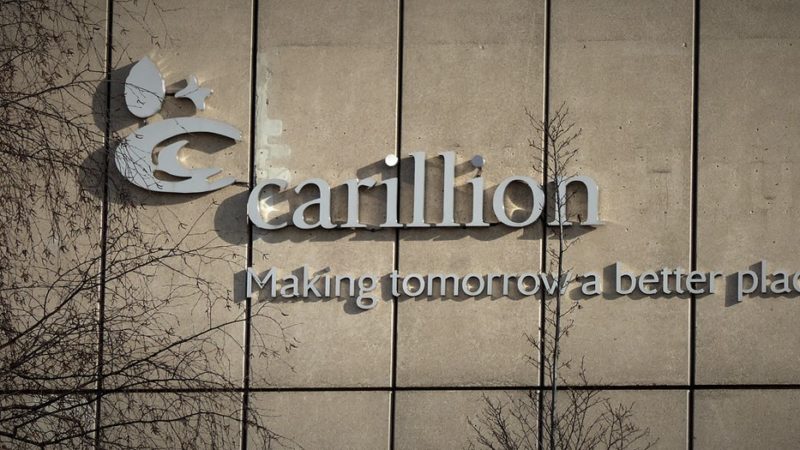Little has changed since Carillion went into liquidation two years ago

On this day two years ago, Carillion, one of the UK’s major construction and outsourcing companies collapsed and was placed into compulsory liquidation. Not for the first time, a major corporate collapse exposed shortcomings of the system of corporate governance, accounting, auditing and regulatory architecture.
To soothe public concerns, the government asked Insolvency Service to “fast-track investigation” into Carillion’s directors. It asked the Financial Reporting Council to “quickly and thoroughly” investigate accounting and auditing of Carillion. Two years later, no regulatory report has appeared. Indeed, little has changed.
Scandalous
Carillion had the usual collection of non-executive directors, audit committees, remuneration committees, internal auditors and external auditors. None checked the corporate excesses or bothered to provide any meaningful information to the people.
Successive governments have indulged corporations by failing to enact effective company law and empowering stakeholders. Instead, listed companies have been required to voluntarily comply with a fickle and legally unenforceable Code of Corporate Governance. Carillion routinely said that it complied with the Code.
Carillion had aggressive accounting policies which inflated its profits and assets. Its audited accounts carried over £1.1bn of worthless contracts. They also included goodwill (difference between the price paid for an acquisition and the value of net tangible assets acquired) valued at £1.57bn. In view of the company’s precarious financial position, this should have been written down to zero, but was not. It was all in accordance with the accounting standards issued by the Financial Reporting Council (FRC).
Inflated profits enabled Carillion to pay high dividends. It borrowed over £1.5bn to fund dividends and cover its precarious financial position. Company directors held shares and share options whose value was inflated by reported profits. The company’s remuneration committee awarded directors performance-related bonuses on the strength of reported profits.
Carillion liquidation affected some 43,000 employees around the world, including 19,000 in the UK. Carillion had liabilities of £7bn and just £29m cash. It owed £2bn to 30,000 suppliers who are unlikely to recover anything. Its employee pension scheme had a deficit of around £2.6bn. A possible bailout by the Pension Protection Fund is restricted to a maximum of 90% of the deficit, which means that 27,000 employees would lose some of their pension rights.
For 19 years before its collapse, Carillion was audited by KPMG and always received a clean bill of health. It collected £29m in fees. Since 2009, Deloitte ran the company’s internal audit function which was supposed to warn the company of risks and poor management. Deloitte pocketed £10m in fees. Ernst & Young advised Carillion on a possible turnaround. There was no turnaround but the firm collected £10.8m in fees.
PricewaterhouseCoopers (PwC) advised the company, its pension schemes and the government on Carillion contracts. In January 2018, the Official Receiver was appointed as liquidator. Despite a conflict of interest, PwC became Special Managers to support the liquidator. For the first year of the company’s liquidation, PwC collected £44.2m in fees and more to follow. Its partners were being charged at over £1,100 per hour.
Reforms? What reforms?
Despite Carillion and subsequent scandals at Thomas Cook, Patisserie Valerie, London Capital & Finance, the UK remains wedded to the shareholder-centric model of corporate governance. The presence of employee-elected directors on company boards could check the haemorrhage of cash into excessive dividends and executive pay and force companies to focus on their long-term wellbeing, but UK company law does not require this. The government clings on to the voluntary Code of Corporate Governance. The UK still does not have a central enforcer of company law. No Carillion director has been prosecuted, disqualified or forced to return any of the bonuses.
Pension schemes remain classified as unsecured creditors. The Pension Schemes Bill currently going through parliament states that the “wilful or grossly reckless behaviour” of directors endangering a company pension scheme could result in a prison sentence of up to seven years. The “wilful or grossly reckless behaviour” is a very high bar and very few, if any directors, are likely to fall foul. The legislation assumes that companies would maintain adequate capital to meet their obligations, but the accounting rules promulgated by the FRC lack any coherent concept of capital maintenance.
The aggressive accounting practices of Carillion are still permitted. There has been no reform of auditing. Directors continue to select and remunerate auditors.
Following a report by Sir John Kingman the FRC is to be replaced by the Audit, Reporting and Governance Authority (ARGA), but there is no plan to eliminate the influence of corporate grandees and big accounting firms on the making of accounting and auditing rules. The Competition and Markets Authority has looked at the lack of competition in the auditing industry, but this has not resulted in any reforms. Another inquiry by Sir Donald Brydon focused on audit quality and effectiveness, but the report does not examine the organisational culture and public accountability of audit firms, a key ingredient in the manufacture of audits.
The Carillion collapse has been followed by the familiar promises of reforms, but little has changed. More avoidable scandals are inevitable.
Prem Sikka is professor of accounting at the University of Sheffield and emeritus professor of accounting at the University of Essex. He is a contributing editor to LFF and tweets here.




2 Responses to “Prof Prem Sikka: The Carillion collapse was followed by promises of reforms, but more avoidable scandals are inevitable”
Why didn't auditors spot Ted Baker's overstated inventory? | Left Foot Forward
[…] The Carillion collapse was followed by promises of reforms, but more avoidable scandals are inevitab… – Prem Sikka […]
Why didn’t auditors spot Ted Baker’s overstated inventory? – LeftVoice
[…] The Carillion collapse was followed by promises of reforms, but more avoidable scandals are inevitab… – Prem Sikka […]